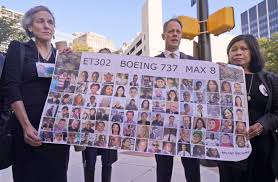Deep Dive into Proposed Boeing Plea Agreement (Part II of III)

DOJ and Boeing have entered into a proposed plea agreement that will require judicial scrutiny and determinations of the public interest and the victims’ rights under the Crime Victims’ Rights Act, 18 U.S.C. § 3771 [“CVRA”]. The prosed Plea Agreement includes several interesting features that address appointment of an independent compliance monitor, and Boeing’s consideration of the impact of Boeing’s malfeasance on the victims’ families.
Consistent with the DPA, Boeing is being required to plead guilty to the previously filed Criminal Information setting forth one count of conspiracy to defraud the FAA’s evaluation of the 737 MAX airplane. By pleading guilty to this charge, Boeing seeks to avoid a trial over its conduct relating to the pair of deadly crashes in 2018 and 2019, involving the Lion Air Flight 610 and Ethiopian Airlines Flight 302 airplane crashes.
The plea agreement must still be approved by U.S. District Judge Reed O’Connor in Fort Worth, Texas. The families of victims of the crashes plan to oppose the plea agreement.

Under the Plea Agreement, Boeing has agreed to pay a fine of $243.6 million and invest at least $455 million to strengthen its compliance and safety programs. In reaching the Agreement, DOJ cited:
a. Boeing’s breach of the DPA by failing to design, implement, and enforce a compliance and ethics program, including failing to sufficiently integrate its ethics and compliance program;
b. The seriousness of the offense conduct involving deceit of the FAA Airplane Evaluation Group about the Boeing 737 MAX’s Maneuvering Characteristics Augmentation System (“MCAS”) that impacted its flight control system;
c. Boeing’s prior efforts to enhance its compliance program through structural and leadership changes, including but not limited to steps to enhance the independence, capability, and effectiveness of its compliance program;
d. Notwithstanding the state of Boeing’s compliance program and the progress of its remediation, including the fact that the Defendant’s anti-fraud compliance program and internal controls have not been fully implemented or tested, and because of the deficiencies outlined in the Factual Basis, Boeing has agreed to the imposition of an independent compliance monitor for a three-year term.
e. Boeing has agreed to continue to cooperate; and
f. Boeing has agreed to pay lawful restitution owed to the heirs, relatives, and/or legal beneficiaries of the crash victims of Lion Air Flight 610 and Ethiopian Airlines Flight 302 (collectively, “Crash Victim Families”). The amount owed shall be determined by the Court and subject to any timely and proper appeal.

The Plea Agreement includes several interesting provisions.
First, under Paragraph 25f, DOJ and Boeing exclude from the District Court’s jurisdiction, any role in the oversight of the Independent Compliance Monitor. This is aimed at avoiding the difficulties and controversies DOJ faced in the Carnival Cruise Lines monitorship where the Court sought to enforce oversight obligations as part of the criminal probation of Carnival when they re-offended or breached the plea agreement in that case.
Second, under Paragraph 25g, Boeing is required to invest in its compliance, quality, and safety programs, a total of at least $455,000,000, representing on an average annual basis an increase of approximately 75% above the Defendant’s previously planned expenditures.
Third, under Paragraph 25h, Boeing is required to ensure that its Board of Directors holds a meeting with the Crash Victim Families, should they wish to attend, and their legal representatives within four (4) months after the Defendant is sentenced. The Defendant shall meet and confer with the representatives of the Crash Victim Families in a good faith effort to select a mutually agreeable date and location for the meeting.
Fourth, under Paragraphs 29 to 37, DOJ sets out terms for the appointment of an Independent Compliance Monitor, who will have a term of three years. DOJ intends to post a request for proposals by Monitor candidates. DOJ will select six candidates. Boeing will then have the right to remove one of the 6 candidates. Once DOJ selects a Monitor from the remaining five candidates, DOJ will file under seal with the Court notification of its selection.

Families of the victims oppose the plea agreement on a number of grounds. The Families claim that the plea agreement does not include an acknowledgement for responsibility for the killing of the passengers, imposes only a minimal penalty of $243.6 million and should have the Court play a more active role in teh selection and oversight of a Monitor. In addition, the Families claim the Plea Agreement is too restrictive and ties the hands of the Court under the Rule 11(c)(1)(C) filing. Further, the Families claim that the sentencing guideline calculation is inaccurate since it does not take into account the resulting death of the passengers in the two crashes. Finally, the Families argue that the Plea Agreement inappropriately “exonerates” the Boeing senior executives at the time of the crashes.















